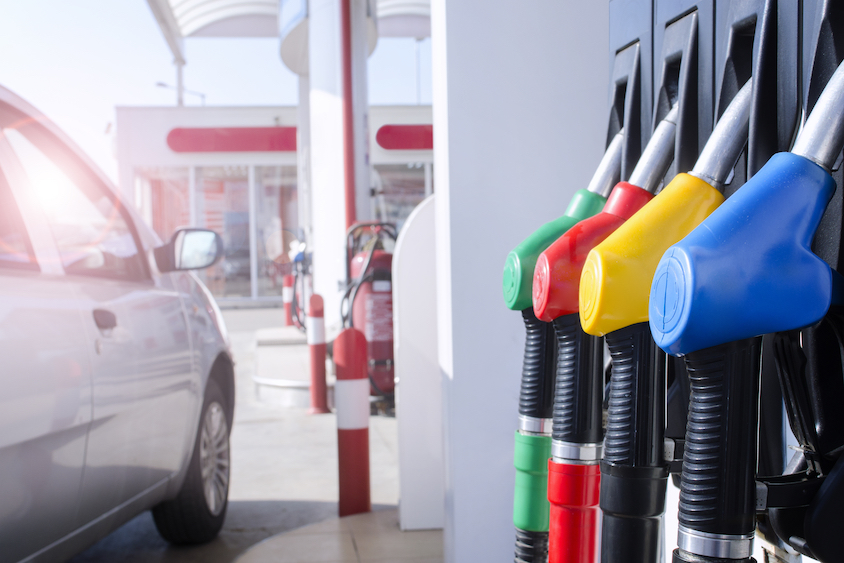UK Fuel Guide for SMEs
Written by: , Last updated:2nd September 2024

UK Fuel plays a major role in the economy. It’s a core component of the transport sector, which saw 176 billion tonne-kilometres of domestic freight transported in 2020. A whopping 77% of that freight was moved by road, and is the product of operations conducted by businesses of all shapes and sizes – from large multinational corporations to SMEs that are just starting out on their journeys with commercial freight.
All of these freight businesses, and even transport businesses such as taxi ranks, share at least one trait in common, which is a dependency on fuel. Consequently, it’s important to understand:
- What is fuel?
- What type of fuel your business should be investing in.
- How you can save money on fuel costs.
- What infrastructure is needed to source fuel consistently.
This is what we’ll cover in this guide, as we dive into all things fuel.
What is fuel?
Firstly, then, what do we mean by ‘fuel?’ Well, fuel is quite simply a material burned by a vehicle engine for power. Better quality, cleaner fuels such as bio fuel may enable cars to run a little more efficiently, travelling that bit further than cheaper fuel counterparts, but these typically come with a higher price tag attached.
So, navigating the fuel landscape and determining which types of fuel to purchase could have a massive impact on your business’s bottom line. For example, would it be smarter to invest in diesel-powered company cars than petrol alternatives? Or is electric the way forward?
To help make a decision, let’s break down the different types of fuel.
Types of fuel
The main types of fuel utilised by UK fleets are:
Unleaded petrol
Unleaded petrol is the most common type of fuel you’ll find powering vehicles in the UK, and in the wider western hemisphere. It’s most commonly available in three main variants:
- Unleaded petrol – the standard petroleum variant available at virtually all petrol stations. Including E5, E10 options.
- Super unleaded petrol – a higher octane version of petrol that’s typically slightly more expensive but equally more efficient.
- Liquified petroleum gas (LPG) – made from propane and butane, LPG is available at the majority of petrol stations in the UK. It’s more environmentally friendly, quieter, and cheaper than petrol, and despite being slightly less fuel efficient per gallon, it could yield substantial cost savings. However, a converter is needed for regular cars to be able to run on LPG.
Modern petrol variants are a drastic improvement upon the older lead-based petrol that was a staple of fuel stations, and they present a range of options for powering company cars and fleet vehicles.
How much is petrol per litre?
The current average price of petrol in the UK is £1.47 per litre, according to the RAC. This price can fluctuate daily based on your location and the petrol station you choose, but it reflects the current national average.
How many miles per litre of petrol?
The miles you can achieve per litre of petrol (MPL) can vary widely depending on factors such as vehicle type, driving conditions, and habits. With our mileage counter, you can track how many miles your fleet vehicles cover in a typical day, along with other valuable insights.
Diesel
Also worth mentioning is diesel, which is widely known as being more fuel efficient than petrol. That’s because diesel is comprised of more long-chain hydrocarbons than petrol, meaning it’s packed with energy – which works at around 15% more energy per litre.
Fuel economy is crucial to the success of commercial fleets, and so diesel could be considered an attractive option for vehicles transporting freight at high speeds over long distances – especially due to the extra torque drivers can feel from a diesel engine.
That said, there have been concerns shared around the potential dangers that diesel fumes could pose to drivers, which some suppliers have disputed, but either way it’s worth looking into diesel as an efficient, if a little expensive, fuel source for commercial vehicles.
Diesel fuel prices
As of August 2024, the average price of diesel in the UK stands at 152.79p per litre, according to the latest figures from the RAC. However, this price can fluctuate daily due to various industry-related events.
How many miles per litre of diesel?
The distance you can travel on a litre of diesel varies depending on the vehicle type, driving conditions, and habits. On average, diesel cars travel 43 miles per gallon.
Electricity
However, there’s a new type of fuel that’s sweeping the UK market. That’s electric power – which can be generated either via public charging stations, or standalone charging points that are installed either at fleet depos or even residential houses.
There are some obvious and attractive benefits to electrifying a commercial fleet, including:
- That electricity is the cheapest type of fuel you can find in the market. The government’s advisory fuel rates suggest that electricity costs around five pence per mile, compared to upward of twelve pence for petrol and diesel engines (which varies based on engine size and the likes).
- Sustainability – electricity can be generated via renewable sources, and is consequently less damaging for the environment than mining and burning petroleum. As an SME in the UK, you may also do well to consider how fuel legislation could penalise the use of non-renewable fuel sources moving forward, and forecast as to how this may impact your fleet’s bottom line before making a decision about which fuel to use.
How can you avoid wasting fuel?
Regular maintenance and efficient operations
Maintaining vehicles and equipment regularly is essential for fuel efficiency. Routine checks, timely repairs, and ensuring vehicles are in optimal condition can prevent fuel waste. Efficient route planning, using tools to optimise delivery routes, and avoiding traffic congestion further reduce fuel consumption.
Which driving technique can save fuel
Encouraging smooth driving habits and minimising idling can significantly reduce fuel consumption. Investing in telematics systems to monitor driving behaviour and fuel management systems to track usage provides valuable data to identify inefficiencies. Upgrading to fuel-efficient vehicles or machinery and exploring alternative fuels can also contribute to reduced fuel consumption.
Load optimisation and employee engagement
Optimising cargo loads and reducing excess weight in vehicles are simple yet effective ways to conserve fuel. Setting clear fuel efficiency targets, monitoring progress, and involving employees through training and incentive programs can foster a culture of energy-conscious behaviour across the organisation.
Alternative strategies and monitoring
Consolidating trips, promoting carpooling, and exploring alternative transportation methods help reduce overall fuel usage. Monitoring fuel purchases, keeping detailed records, and negotiating better rates with suppliers can lead to cost savings and more efficient fuel management. These combined efforts can help SMEs reduce fuel consumption and lower operational costs.
Read more in our 5 things that will reduce fuel consumption guide.
Fuel additives
Fuel additives are chemical compounds added to fuel to enhance its performance, efficiency, and longevity.
They serve various purposes, such as improving combustion, cleaning engine components, reducing emissions, and preventing fuel degradation.
Common types of fuel additives include detergents that keep fuel injectors clean, lubricants that reduce wear on engine parts, and stabilisers that prevent fuel from breaking down over time.
While some additives are included in fuel by manufacturers, others can be purchased separately and added by consumers to address specific issues or optimise engine performance.
Which type of fuel should I use for UK company cars and fleets?
So, which fuel type should you choose for your commercial fleet? See below for a fuel comparison.

It’s a difficult question to answer, however there are a few key elements to this formula that apply to the vast majority of fleets. You could proceed by:
- Identifying the fuel demands of your fleet. This is made easier by planning your routes in advance and creating accurate forecasts about how much fuel you’ll need during the upcoming months.
- Factoring in your current fleet capacity. If you’re using a fleet that comprises solely diesel HGVs at present, then you have to conduct a cost-benefit analysis when considering a move over to electric or petrol equivalents. There’s the up-front cost of new vehicles to consider, as well as ongoing costs – and your ability to reliably source fuel from petrol stations based on your planned routes.
- Calculating the cost of fuel for your fleet. Comparing all the options available to you based on your routes, mapping out petrol station availability, and choosing a fuel card that specifically benefits your fleet by giving drivers access to cheaper fuel prices.
- Thinking about longevity. The government plans to ban the sale of new petrol and diesel cars as of 2030, and so it feels the transition toward electric fleets and roads is an inevitability that businesses in the UK must embrace.
There could be cost-saving advantages for fleets that are willing to electrify and embrace sustainability with a positive and open mindset. This is partly due to the government grants and subsidiaries available for SMEs that invest in low-emission plug-in vehicles, and partly due to the operational advantages of building an electric infrastructure gradually – which enables companies to start taking orders as soon as EVs are purchased.
For example, it’s worth considering the time required to install EV charging points. With this technology already proving fairly affordable for fleets, it may be wise for SMEs to set up charging stations within depos in the near future. This may mean that any EVs purchased later down the line, when the tech becomes cheaper and more available, can be utilised quickly – while avoiding premiums for charging point installation that may come about as competitors rush to electrify.
Additionally, showcasing your business’ openness to and use of electric power could help you build strong relationships and with customers and suppliers who share those same sustainable brand principles – or unlock new partnership opportunities.
Fuel pump near me
Our Fuel Card Services Pump Locator is a tool designed to help users find the nearest fuel stations that accept their fuel cards, making it easier to manage and control fuel expenses. By using this online locator, businesses and drivers can quickly identify nearby stations, ensuring they can refuel conveniently and take advantage of their fuel card benefits, such as discounts or streamlined payments. This service is particularly useful for fleet managers and drivers who need to plan routes efficiently and minimise downtime.
How can business fuel cards help?
At Fuel Card Services, we specialise in helping businesses save money on their fuel costs. We do this in a number of ways, from offering a range of branded UK fuel cards that can make a real impact on your bottom line for every mile driven by your team, to offering an advanced suite of fleet services that are designed to help your vehicles and operations run more efficiently.
For example, our MileageCount software and advanced telematics service can be used to properly track your driver’s routes, and plan routes efficiently – which is a prerequisite to calculating the fuel demands of your fleet. Additionally, our fuel cards can get you access to virtually any type of unleaded or diesel fuel at almost any pump across the UK – all you need to do is identify the right fuel card for you – which our experts can support with.
If you think your fleet could benefit from our cards and services, get in touch today and see how we can help you.
back


